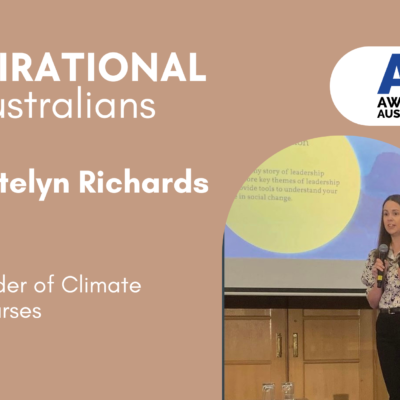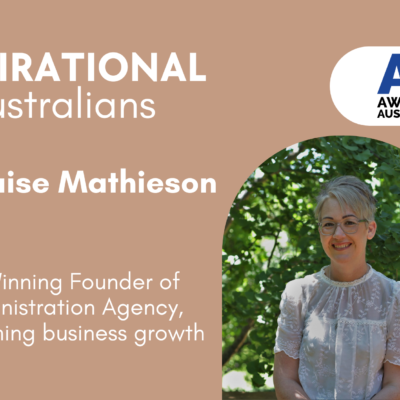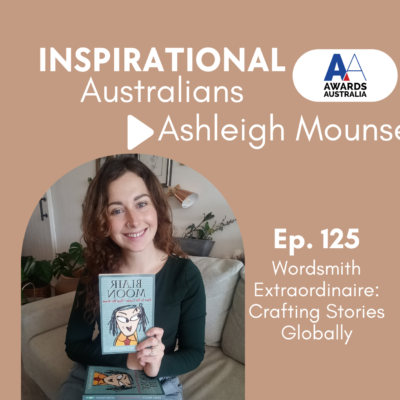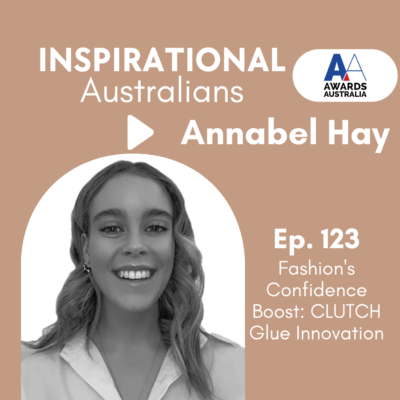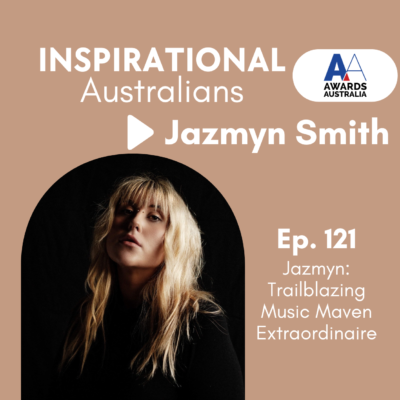In this week’s episode, Josh is talking to John who was a Winner in the 2019 NSW/ACT Regional Achievement and Community Awards.
John is the Principal of Trundle Central School and has shown selfless dedication for the community. He has managed to coordinate multiple individuals and agencies to deliver sustained drought relief to the Trundle community. Under John’s leadership, students have been empowered to help their families in times of significant rural need. Their mental health has also been improved. The School was featured on BBC, China News and Seven Network’s Sunrise, leading to visits by rural aid, rotary clubs, government and other organisations. In the last 12 months, they have secured 250 food and toiletry packages and have injected $70,000 into the Trundle economy.
In this episode:
- Hear how passionate John is about “his kids” and how much the welfare of his students means to him
- From dropping out of school to becoming a Principal is a great story
- Hear how committed John is improving his rural communities mental health
Links
Trundle Central School’s website
Follow us on our Inspirational.Australians Instagram Page
Want to nominate someone? (It can take as little as 2 minutes to recognise someone making a difference)
Like some more information on Corporate Partnership?
Transcript
Annette:
Welcome to the inspirational Australians podcast, where we chat to people, making a difference in their communities and in the lives of others. And here is your host for today, Josh Griffin
Josh:
Hello and welcome to the inspirational Australians podcast for your weekly dose of inspiration. Today, we’ve got a guest named John who’s a principal of a school. That’s a regional school called Trundle Central School. And for those who don’t know where Trundle is, it’s near Dubbo. I’m sure John will give us a more precise location than that once we speak to him. But John has shown selfless dedication for the community. He has managed to coordinate multiple individuals and agencies to deliver sustained drought relief to the Trundle community. Under John’s leadership, students have been empowered to help their families in times of significant rural need. The mental health has also been improved. The school was featured on BBC, China News and Seven Networks Sunrise leading to visits by rural aid, rotary clubs, government, and other organizations. The last 12 months, they have secured 250 food and toiletry packages and injected $170,000 into the Trundle economy, incredible stuff. And I’m really excited to speak to John today. As I said, the principle of Trundle Central School. Welcome John.
John:
Thanks very much for having me!
Josh:
Absolute pleasure, John, uh, for those who are consuming this and the audio and podcast, the usual podcasts way, they won’t be able to see it in your background. I’m loving it. I can see the certificate and the trophy that you won from the Transgrid Leadership Award last year. So, that might be a good place to start. Can you tell us a little bit about your experience, you know, maybe the whole way through for being from the nomination to finding out you’re a finalist to, you know, to receiving that award?
John:
Yeah. Well, it’s a bit of a roller coaster because just being nominated was such an honor, because when you put yourself out in the public domain, you sort of expose yourself for criticism and people thinking that you’re doing it for some sort of personal glory.
So it was just such an honor to be recognized by other people that yes, we have got a lot of positive publicity that we’re not doing it for that we’re actually doing it for the community. So that was great. And just the professionalism of the organization, the dinner was fantastic and the people, and it was just, it was just like an honor to go through the journey of it all. Even if we did, even if we didn’t win, it was still such an amazing experience. It was probably one of the better things that I’ve done in my life. So thank you to the organization.
JoshL
Well, there’s a pretty long list of achievements there and that’s pretty cool to hear that that was one of the best things you’ve done. So no, that’s awesome. And what was the drive like going from, you know, cause was I correct in saying that pretty close to Dubbo? That’s what Google maps is telling me.
John:
Oh my with, with still an hour, an hour and 45 minutes away from Dubbo. So we’re, we’re about 60 K’s inland from parks and Forbes. So pretty much in the new South Wales, you know, weight and shape growing area. So a form of very prosperous area, but it’s a lot of factors which have reduced that productivity in population over the years, but we’re still hanging on. We’re very positive about it.
Josh:
And, uh, what’s the, you know, you may or may not know this, but what’s the population like roughly in your, you know, your immediate community.
John:
Wow. That’s 380 people in the township of Trundle. It’s, um, it’s declined and, and sort of stabilize in the last five years, but the drought really knocked us around, like we lost, we lost 25 kids from this school alone, which is, it was devastating. Hopefully now we’ve had rain something. Some things will start to improve again.
Josh:
Yeah. Fingers crossed and well, I guess, can you tell us a little bit about, um, you know, the kids who come to Trundle Central School, what kind of, you know, kids or demographics or whatever coming along?
John:
Well, we have a mixture of children. We have about 60% of our kids are farm kids. They either owned the farms, their families own the farms, they work on the farms and the rest living live in town. We, um, we’re a pretty unique school that we actually deliver out year 11 and 12 thru video conferencing. So we’ve got about another 75 children that video conferencing to us every day to do their work. And it just made me giggle a little bit when kind of locked down happened when people were very worried that children have to learn online and all that time and stuff. Now our year 11 and 12, that’s just their bread and butter. That’s just what I do. They only say that they’re delivering teacher about twice a term, and then they, they do their, their lessons through a combination of lesson packages and video conferencing.
But, um, we have amazing children. We, um, during the, during the drought, I put the challenge out to them. So we can either lay down and be victims of this, or we can stand up and do something. And to every one of my children going involved in a, in a really I could see that it was actually part of it, the personal growth. So the, the award that I got for leadership was I suppose, because I did coordinate and inspire and get people moving in the same direction, but it was really award, It’s really an awards for those kids, you know, and, and my community.
Josh:
Yeah, I think you’re spot on there because, um, yeah, whilst you work, you know, the driving force and, you know, from a logistical standpoint, you did a lot. So don’t downplay your, uh, your great work there, John, but you’re right. It is for the community, this award, it brings great recognition to the community, to the kids at the school, to the teachers, to the parents, because as you said, you can’t do it by yourself.
John:
Yeah. And I’ll have, it brings some sort of recognition that even when droughts aren’t on that, there’s a huge, and I think disgraceful disparity of opportunity between the city and the country and, and a lot of it is generated through apathy, political apathy, but it’s also generated by the fact that we, we socialize our children to be stoic and strong and we make them, we give them this idea that they can’t put their hand up to ask for help. Cause that’s a sign of weakness. And that’s, I think indirectly contributed to the horrendous suicide rate we have in this country from kids from the 18 to 24, especially on miles, I’ve lost in my I’ve always taught in country schools. I just love teaching the country. My teaching career, I’ve lost 13 young people for suicide. That’s just, just rain this thing. And look, people might, might think that we got involved in the drought relief. Well, initially got involved in it because we wanted to maintain human dignity. We had people running out of water and in a wealthy country like Australia, that’s just an strange thing. So we put washing machines in, we put showers and we, we gave, especially our country women, that bit of dignity to be able to have a hot shower at night. But it was also to, to tell my kids that it’s time to be proactive. It’s time to get out and talk to politicians and decision makers and say, Hey, we might live 60 K’s from the nearest traffic light, but we’re still important. And you’ve got to govern for this whole country. So there was a lot of indirect things that went with it and are still going today. Josh, we were running mental health awareness for the community with got dental van here, you know, the doctor visits here. We do hearing checks with all that tough stuff, because at this school were determined to say, it doesn’t matter where you live in this country. You still deserve that level of service.
Josh:
I couldn’t agree more. And, uh, I think, you know, that just shows that you guys are pros in this, uh, video learning and home learning from home through technology. And a lot of people wouldn’t think that a rural school would be good at that, but I think that’s fighting battling a couple of exceptions there
John:
Look I’m with the risk of getting some of the more important people in the educational side, but I’m pretty good at that too. We’ve, um, we’ve become corporatized in education. And I think that’s to the detriment of our kids with we’re data driven and we’re outcome driven and we’re all this type of stuff. And we, we, we look at a school’s value through its literacy and numeracy schools and all that top stuff. And that’s important. Don’t get, don’t get me wrong, but we’ve got to take our corporate banner off sometimes. And we’ve got to say, every child in your school deserves an opportunity. And like last, last week we actually gave away blankets and warm pajamas and sheets to all our primary school kids because of the, the great generosity of people in cities and that type of stuff. And I’m saying, I’m not saying to the parents, you can’t provide that. I’m saying to the parents, here’s a little helping hand if 1 in 10 of those kids it’s called at night because the parents can’t afford it. Or the parents won’t buy that sort of things. The school has done that. And the school shown that child that it’s important to get your assignment and support and to be good at maths and english and all that type stuff. But it’s also important to be you and, and to have the space. And that’s what we’re here. Well, that’s what I’m on about. And it’s not, it’s not just raising money and getting bottles of water. It’s sending that message out to everybody that they’re important.
Josh:
So, John, you’ve got a really clear message and I can tell, you know, what your values are just from talking to you. How do you, I guess, pass that down to your staff and, um, and kind of, you know, pass that message on to the community.
John
That’s to start. That’s not that hard because if you work in my school, part of your whole being is, is your compassionate for individuals. Because if you’re not, I don’t want to sound like a bully and I’m certainly not, but I will certainly encourage you very, very much to be like that because that’s what to the community it’s really hard because country communities, don’t like people looking from the outside in, you have to really guide their confidence to start off with. Then you have to be, I suppose, leading their battle. Okay. So I have over the years, I’ve been here six years, I have got, some people have saw it and I have upset them because I’ve said to them, it’s not good enough. It’s not good enough to have this mindset that your kids don’t have opportunity. And it’s not good enough to spend your money on things and your kids suffer. You know? So it is very easy to get people off in country, country towns. Those are that. And you also have to remember that there is a percentage of population in any country town or any town that come to places like Trundle or run away. I don’t want the responsibility. They don’t want that personal challenge of being better and, and aspiring stuff because there’s, there’s been things in their life that have maybe taken why that inner drive, that spirit that loved that they’re in a being. So it’s very difficult. But what I think you need to do is one, you need to have plenty of Teflon. He put your Teflon on and you go, you go out there and you, you’re not afraid to challenge the norms and not afraid to challenge the social structures that place people in a, in a certain stratification in a town.
Because in my school, I want to tell people that it doesn’t matter. What soon as you walk through this gate, it doesn’t matter whether you come from and many of the kids come from places without running water, or, you know, some places still got dirt floors and kids go outside to go to the toilet. You know, and I say that to people and I say that it couldn’t possibly be true, but it is now there’s huge, um, situational and ingrained poverty in the country that just gets swept under the carpet. So it doesn’t matter if you come from that, where you come from a multimillion dollar farming enterprise, once you walk through my gate? You are equal in opportunity, right? So that’s, that’s something that I’ve always strived to put in, into my kids. And that’s, and thankfully it’s reflected in the management of their school because Ellis RC has kids from all different social stratifications, running the school as kids.
Josh:
Would you be happy to share some stories of, uh, I guess some kids, so you’ve seen tremendous growth and, um, and what’s that, what’s that like to be part of that, that must be really rewarding.
John:
Yeah. It’s rewarding. And it can be emotionally challenging as well because you got to bed at night and put your head down on the pillow and you know that your kids are safe and your kids are warm, but you also know out there that despite your best efforts that are in kids, that aren’t warm inside, that’s, that’s emotionally challenging. You know what, if I can indulge it by sharing a story, we were gave some donors away last year and some, some mattress that top stuff. One of them, one of my boys came in and he’s in year six, he might’ve been younger then, but he came in. I said, mate, why are you so late, you know you’re so late for school, you’re never late for school. You’re always in the gate by 830. He said, Oh, so warm last night, I just kept sleeping. And I did not want to get out of bed. And I thought, well, this might be a bit challenging and you’re not going to have some sleepless nights, but it really doesn’t get any better than that. I had another lady last year, she’s they do a pretty tough because they farm pigs. That market’s pretty bad. And she, uh, daughter got off the bus and she had a food hamper and had mom’s pantry packs in it. I would put perfume and soaps and all that type stuff, and she’d burst out crying. And then the daughter said, mom, this is a great thing. What are you doing? What are you crying for? You should be happy. And she said, well, I’m out here and I’m dirty and I’m sweaty. And I just had enough and you’ve got off the bus and you’ve shown me that somebody cares. Yeah. So, you know, I dunno if that’s leadership or a lack, but it doesn’t get much better than that. So say it’s put out with all the people saying, man, you, you know, for the glory and all that tough stuff, when you get things come back and that, that child, it doesn’t matter how many schools they go to and how old they get. We’ll. Remember that Trundle Central School was that the school that gave her mother, that experience of being so happy. That’s right. Good.
Josh:
You need to hang on to those stories sometimes when it is tough, because now you remember that you are making an impact for those kids and their families. So that’s really special. I think.
John:
Yeah, it is really it’s. I’m like I get just as much kick out of a child who struggles academically, or has a disability just getting through and getting a job. Then we’ve had some outstanding H series. So yeah, that’s, that’s great too, but it’s, it’s great across the whole spectrum.
Josh:
Well, now there’s some really wonderful parallels between what you’re talking about and I guess your mission as a principal and a leader of the school with our very first guest on this podcast, Navdeep. So he’s a young guy who’s really passionate about helping teachers to improve and with teachers’ wellbeing, um, and kind of he’s mission is that he wants every single kid to feel the way that you’re talking about to have to be cared for by that teacher in their school. Um, and I think he would be so thrilled to hear what you’re talking about, John.
John:
Yeah. Well, it’s, um, I’d say it’s an interesting power as a teacher, as a teacher, you have the power to uplift the child. They walk out of the school and they’re kissing the clouds when I go through the gate, but you also have the power to absolutely devastate that child’s confidence. So you’ve got it. And sometimes you’ll do that with not even thinking I’m not even wanting to do it. You know, one of the biggest challenges that I’ve had in my life is that I left school as quick as I could. I left school even before the end of year 10. And basically I was illiterate, is that a huge challenge for me is the need to develop my literacy myself for them, for the motivation of it, because yeah, I did have an experience at school where I was shattered emotionally and self-confidence, but by comments that teachers were making and that’s, that’s one of my absolute goals in life that my children, when they leave this school, at least one of them is kissing the clouds. Cause I think they’re so important.
Josh:
So that must’ve really driven you, I guess, in your journey becoming an educator that your own personal experience.
John:
Absolutely. Because I also know what it’s like to struggle with illiteracy and trying to get employment. And even more now that we’re, we’re getting into a society that unfortunately I think that if you don’t have massive pieces of paper in gold frames that nobody needs or wants to know you.
Josh:
So how did you do it, John? Did you just have a time or assistance kind of teach you?
John:
Well, I had a very bad motorcycle accident, which in retrospect, the first best thing that ever happened to me, I broke my, my leg and two arms and I was just lying there in hospitals thinking like, what are you going to do? You’re trap, you got to, you’ve got two broken arms.
Josh:
How old were you at this point, John?
John:
I was 18, 19. So instead of seeing around, I decided to enroll in a correspondence school and just kept going and going and going and trying to hide that poor level of literacy all the time. And then as I became more confident to stand up for myself, I was look at me. I need some help. I need to know where this literacy. So I had some very good people that helped me through at school and of course, correspondence school. They are amazing. So a lot of it was, was in a drive. You know, like you get to a stage in your life where you think, yeah, you look in the mirror and say, you’re better. You’re better than, than what you’re showing the world. And I often say that the kids here, I know you’re better than what you are. So why aren’t you showing the rest of the world, how good you are and not nine times out of 10, they walk out and think, Oh, he’s finally lost it. You know, but you get that one little lot. That moment and the kid says, well, no, I am going to show them. Well, no, I went on and you know, I graduated from, you can tell us a unit with first class honors. And I went on to do, I’ve got two master’s degrees. I went on to serve on Newcastle University Academic Board for 12 months and Student Representatives Module. I didn’t tell them that. I really didn’t understand what they’re talking about. A lot of that was fun. I think one of the things I’ve learned over the many years is that it doesn’t matter if the person’s wearing a suit or has got a fancy title. I was making a lot of money. It still got all the insecurities and the personal challenges that you’ve got. So, yeah. So it’s just a matter of, overcoming those challenges and driving that, that frustration and sometimes anger into a positive.
Josh:
Yeah. I really enjoyed what you said before about, um, you know, saying I’m better than this. And you know, in terms of tying that to you, your role as a teacher and a principal and your teaching in general, sometimes it’s hard for people, you know, whether adults or kids, whatever, to, to say that to ourselves and to have that self belief and to have someone say that to you like to say, no, I believe in you, you are better than this that’s sometimes it’s all you need to be able to say, to say it yourself.
John:
That’s right. A lot, a lot of kids, especially kids that have had a pretty hard journey through life that they put up an absolute barrier in front of them because that’s a survival technique. We have a lot of out of home care, kids come through this school and some of them are, have been physically and emotionally beaten around for lack of a better word. And sometimes you just don’t keep telling them because they’ve heard so many people let them down it’s the, you know, like the lightest one we had, I just, can’t just something simple as I cannot engage her book pack. I said, here here’s some brand new books and look on that kid’s face. It was like I said, hit, you’ve just won the lottery. And it comes through a new Ferrari. It was just that somebody didn’t think that she was going to be the person that just comes into the school for three months and then we’ll get suspended or expelled golly out in that time. So somebody saying, you need some new books because you’re going to be here for a long time and have you got a computer? And you know, a lot of times people will tell kids that they’re special, but they, with their body language and the way that they treat them, it’s pretty obvious through the perception of the kid that you don’t think that at all.
Josh:
That’s great stuff. Interesting. So, uh, you know, I’m glad that you told me about the, uh, the accident and things that drive you. Um, cause I know you were a very passionate guy and you’ve got some, you know, passions outside of, you know, being a principal and things like that. You told me, and this was a little bit embarrassing in some respects, we kind of chatted about this off air briefly. Then I asked you off the air, you know, what are your passions? You have, for example, I like to make coffee and things like that. And then you came through with that. I like to study historical figures and learn from them. Turn that a little bit. Cause that was really interesting.
John:
Yeah. I often wonder why some people can, can get others to go in a common direction. Like they can give their passions and people will run with them and understand it that some of the people that I’ve done a lot of study on aren’t exactly the world’s greatest people, but they still had that ability to, to, to motivate, to make a change. I often say to my wife and she’s, she, she gets quite upset with me because I say to her, what have I done? You know, what, what change have I made? And she goes through all those things. And I said, well say, yeah, but you know, what, what is it, what can I do more? You know, you study these people and some of the people in Vietnam war era, and you know, the black, civil rights people in America, you know, fancy being one voice amongst, all those voices saying that you can’t do it.
No, I was only saying this on assembly and kids that if some guy said I’m going to just do some dangerous behavior and you don’t use your voice, your just as you’re just as responsible for that as the person that’s doing it, that’s a very difficult concept for a teenager because obviously they want to be popular and talk stuff. But imagine if some of the great civil rights leaders like Nelson Mandela, Nelson Mandela didn’t stand up, you know, so there’s so much that we can learn and so much inspiration from those type of people that just human nature fascinates me. Why some people are bad. Like you got people like Jim Jones, it did incredibly hideous thing, but he had all those people that believed in him so much.
Josh:
Well, yeah. Leadership can be, well, it’s a very powerful quality for someone to have, and it can be used for good or bad purposes as you just touched on.
John:
Certainly can. Interesting.
Josh:
Yeah. That is, uh, you know, um, yeah, pretty interesting. And I guess I’m not the common thing to, as a passion or a hobby of yours is to study those people.
John:
It’s the same with kids, I’d say some kids in my school that’s just natural leaders, you know, and you think if somebody doesn’t get hold of that child and foster that and say, look, you can, you can make people move our country. You know, we’ve got Aboriginal kids here that are natural leaders of people and wouldn’t it be such an amazing waste of talent. If somebody didn’t nurture that and say, look, your people need you. Your people need young leaders go out and do it. But then there’s all these other things in society and yeah. Technological age and all that time to stop and say, no, no, no, no. Don’t put your hand up. That’d be that person that’s out there. It’s interesting.
Josh:
Tall poppy syndrome is a little bit…
John:
The country is great for that. If you buy a new car, you’ve, you’re flaunting your wealth, you know, you’re opposite of that type of stuff. It’s not like good on you. You’ve worked over time. That type of stuff. Yeah.
Josh:
Well, I can’t speak about girls cause, uh, you know, I’m a, I’m a, a guy obviously, but it is a guy thing like between males, especially teenage boys casting my mind back to high school. No, you’d be scared sometimes to talk about if you’ve volunteered or you did something good. Um, cause it, people will tease you for it or even if it is just not friendly way. So that is kind of an interesting thing to think about.
John:
That’s why we’ve got, that’s why we’ve got such a horrendous suicide rate in the country because our boys don’t talk.
Josh:
Correct.
Josh:
And one things, one of the things that boys do in this school is that when we seen a lot during the drought is they will have a meltdown or punch a wall, do something like that. And when you scrape back all of the vibrato and the teenage stuff, it’s because they’re frustrated because they can’t talk. And they think that nobody listening, they need to. And if they do say that something’s wrong, they’re weak. That’s, that’s one of the biggest barriers that we have to break down in teenage boys.
Josh:
Yeah, I agree. And I think that’s why I’m hoping that might be tying it back to the awards. That’s why we believe so strongly in sharing stories like you, John and people who are empathetic, empathetic leaders who, you know, show their feelings and who are happy to, you know, you said before you put your Teflon on, I thought that was a really interesting way to say it because you do put yourself out there as a leader to get the criticism. But it’s important to show people who are strong leaders, but empathetic leaders. And that’s what we need to, you know, to foster me now, our young people,
John:
Absolutely as a male, we need to, to, um, show other males role model. And the fact that emotion is not weak, and emotion can be part of the healing process and that emotion doesn’t have to be anger. That’s a very common emotion, but it can be, you know, you can reach out to, to one of your mates and say, Hey, how is it going? you know, like what’s happening? And one of the most powerful things that happened during the drought. So one of my kids said on an interview with a radio station or something, he said, when you say a farmer in town, ask him how he’s gone. Yeah. And say, thanks. So thanks for what you’re doing. Because as blacks and working for $500 an hour or less, sometimes you’re in a drought because they’re just not making any money or they’re going backwards a little bit of. And that’s that goes with the award to a little bit of recognition does put that a little bit of self-doubt, away for a while in a person’s mind. And you say, well, geez, I did do something pretty special or I’m doing something pretty special. Cause I’m not finished. There’s a lot more things I need to do.
Josh:
Yeah, exactly John, um, you know, speaking of that recognition now, what would you say to anyone listening that was thinking about whether it was nominating themselves or this organization or a friend or a family member, what would you say, you know, in terms of encouraging them to do that,
John:
I’d say you deserve to that person. You deserve to yourself, you know, and you’re not, if you don’t recognize yourself, recognize the process and recognize the thought process that went behind and what you were doing, because it’s easy to be a critic or a cheer from the sideline, but it’s a lot more difficult to go ahead and be the catalyst and be the driver and be the public face of a project. So what I’d say is that what in, you says to you that you don’t deserve recognition and that’s what these awards do. They recognize everyone that’s nominated, they recognize the process and they recognize the fact that in regional and country Australia, we need, we need people to go out there and say, this is not good enough, or I can make a difference.
Josh:
That’s great. And, um, you know, one thing I’d like to share with people listening is that there is a, a nominee, there’s an award for everyone. So we, we run regional focused awards. We run community awards and young youth focused awards. So, um, all we want for people is to share their story and give them a platform to inspire others. And that’s kind of why we started this podcast as well, John, which is why I’m so happy to have you on because yeah, the story and the stuff that you’ve been talking about is things that people, especially city-based people like myself don’t think about, you know, it’s, we separate ourselves. And you did say earlier that there’s a big divide in between, you know, how people live regionally, rurally. Um, so it’s important to, to share that. I think.
John:
I would say, and you know, I’m 53 years of age now and I’ve lived in the country all my life. I would say that in the 80’s, I had more services, social services than what I’ve got now.
Josh:
Really, that’s crazy.
John:
I would say there’s been a gradual decline of recognition of country people. And it has been. And with that as common reduction service. This town went best part of 18 months without shop. You couldn’t really, we had to drive the near shop was 68 kilometers away. So you’re looking at 140 kilometer round trip to buy your milk and bread and stuff. But we haven’t had a police officers in our town this year. We have visited by police, that kind of stuff. And look, I, and I’ll get off site with people with this in the country. I blame us to an extent because why aren’t we shouting from the rooftops that it’ not happening. We don’t have mental health services. If we didn’t have mental health services in a Sydney suburb, people would be protesting the streets. They’d be writing to the local member, but country people accept it. And as soon as we accepted it, it becomes the norm, you know, I upset many politicians because I’ve gone on to Sydney radio. And I’ve said that I haven’t visited my school in two years. You haven’t been school in their electorate, with higher rates of mental health, other problems in the community. And you don’t see your local member for years. I think that’s an indication of where we sit as far as the, how important, where, where, where allowed us ourselves to be. And that’s what I’m saying. We haven’t allowed ourselves to be like that. And if we don’t have community leaders and people that are willing to change it, it’s just going to take on.
Josh:
Yeah. It’s tough. John, speaking about willing to change it. I know I’m another one of your passions is, uh, that helping know fathers who haven’t got access to their kids or, you know, there’s obviously that’s such a deep and complex issue. So I know we can’t really, um, capture all of that now, but you know, that’s another thing that you’re involved within in helping people, you know, and that’s tied to, you know, and found out when you’re talking at your literacy and, and things like that, that’s all tied together. Your, um, your own personal experience. Can you tell us a bit about that?
John:
Well, I had a very nasty divorce, which I still have a lot of blame issues that will take me telling me don’t do it and all that time. So the more people tell you don’t do it. The more you reflect on it. And my experience with the family court and the legal system was totally disempowering of, of, of the father in particular. And I imagine many women find it like that as well. It’s, it’s not explained well to you. It’s agonistic. And I think what happens, especially for our country males and a lot of our country males have allow right of literacy is they give up, they become so frustrated with it because they’ll get a court paper and it’ll it’ll have information on it. And they just don’t understand it. They don’t have the level of literacy to do that. So I’ve taken it upon myself to the not only a person that can, I can talk to about it, but also a person who can read it to them and tell them what it means in, in plain English, everyday men terms, you know, everyday people terms. And that that’s because of my experience, but it’s also because of what I see in schools. I see many kids that are suffering because they don’t completely understand what their parents or guidance, right. And I have a whole level of blame of itself. And then unfortunately, sometimes they become almost weapons in the process. And at least if I can get a bloke and say to him, anybody inciting, but it is not true. I’m not trying to be sexist, but it is males that are coming. And my, what this means is that you have these, these amounts of rights and you are allowed to go back to court, you can do those type of things. And this is an avenue where you can get some support financially or counselling all that time, seven, as soon as you say counselling too many country males, it’s like, or, but when you explain to them that it’s not counselling to tell you that you have a problem where you’re to blame it’s counselling, allow your forum to be able to talk to somebody about the motions you’re going through. And if that stops somebody, you know, getting, getting full of gorgon jumping their car and smashing into a train. Oh geez. But takes a little bit of more time. So,
Josh:
Yeah. Yeah. And like I said, it is a very complex issue, but I can just only imagine, um, yeah. As being a dad, myself, just with young kids, if for whatever reason, you know, I wasn’t able to say to them anymore, I know how devastating that would be. And if I didn’t have that understanding or the ability to, you know, try and work out how I could see them, they’re like, know, so I have to commend you on what you’re doing. It is a, a tough and complex issue.
John:
The family court one, there’s a huge delay in it. And that’s another issue, but the family court make unrealistic and impractical judgements because now I had one gentleman talk to me that he’s allowed to see his child during the week on a Wednesday. And he says, well, I work 85 kilometers away from where he is. So I’ve got to drive in as 85 kilometers. And I can’t tell the sheep that I’m going or during the harvest or that sort of things. Some of the judgements is so rigid in their form. It’s just not practical. It’s a huge issue across the state. It’s not only country. Sorry. I might have cut you off.
Josh:
No, not at all. It’s fine. It’s um, yeah, you know, you, you know, better than most being in schools and seeing kids without whether it’s mom, dad, whatever it is, or even just positive role models, we need to do whatever we can to kind of help kids have a positive role models, whether it’s their parents or otherwise.
John:
One of the things I tell every father is if you get access to your child one day fortnight, don’t splash them with gifts, splash them with love. I have many kids that come back with new toys that dad’s given them because he misses them. And actually can’t tell them how much he loves the other than spend money. I’ve had instance where kids will give them away to their friends cause they don’t want them.
Josh:
Well, that’s what you said before. Counselling is so important because that could help the dads to understand, you know, what matters in emotionally. You know, I’m not sure if you’re familiar with the love languages, but that’s a such a key one. If I understand, well, this is what my kid values and I can give them that. So John, I’m really inspired by, um, by the work you do. Um, fighting uphill battles is from what it sounds like to me, but, uh, you’re sprinting at that Hillman. So, you know, you don’t have nearly made it hard to keep it up, but, um, just know that you are inspiring others, even if it just feels like, you know, that conversation with your wife, if he was like, what am I doing? You are doing great stuff, mate. So, um, just wanna, yeah, possibly congratulations to you for winning that award last year, the Transgrid Leadership Award. Um, and I just hope that some other people out there were inspired by that and, uh, we’ll be able to share their stories too.
John:
Thanks Josh!
Josh:
Thanks, John. Really great to talk to you, Mate! I hope you enjoyed our interview. Join us each week, as we talk with ordinary Australians achieving extraordinary things. If you know someone that’s making a difference you can contact us through our Instagram page, inspirational.australians or head to our website awardsaustralia.com and you can nominate them, help spread their story, share their message. Awards Australia is a family owned Australian business, our awesome producer Annette is my mom and other podcast co-host Geoff is my dad. We proudly aim to make a difference in the lives of Australians. And we thank our corporate and not for profit partners to making our awards programs possible. Would your business like to know how to get involved, contact us now. Please subscribe to our podcast, so you won’t miss an episode. And please share this episode with your network and pay it forward. Who doesn’t like to hear a positive, good news story, but also greatly appreciate that if you review and write this series as well, we’d love to hear your thoughts until next week, stay safe and remember together, we make a difference.
Annette:
Thanks for joining us today on the inspirational Australians podcast, we hope you enjoyed listening and have been inspired by ordinary Australians, achieving extraordinary things. So it’s goodbye for another week. Remember together, we make a difference.




